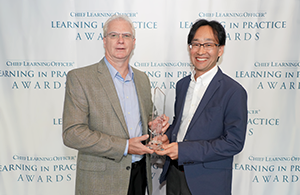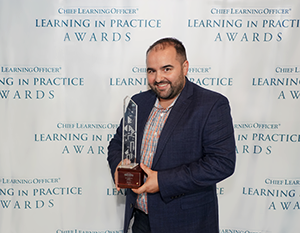The Technology Award is for learning executives who have delivered new and unique applications of emerging technology to employee learning and development.
DIVISION 1: For companies with 10,000 employees or more
GOLD
John Kusi-Mensah, Assistant Vice President, Distribution Capability Center of Expertise, MetLife
When MetLife found its salesforce productivity wasn’t increasing significantly over time, the company realized it needed to find a more profitable way to handle training.
The Distribution Academy was created by John Kusi-Mensah, assistant vice president of the Distribution Capability Center of Expertise at MetLife. It focuses on the training and development of MetLife and partner sales associates through learning and performance solutions. The main goal is to enhance salesforce proficiency, productivity and performance. The program is a working partnership between global, regional and local units. The Distribution Academy comprises an online core curriculum, a sales curriculum and practical practice of executing a sales task, among others. The training tools provided help employees since they have access to online tools when meeting with customers. A part of the program also includes one-to-one sales skills coaching meetings. These meetings are used for sales managers to review the progress the sales associate has made and whether or not they’ve grasped the key learning points in the online modules.
The Distribution Advantage Platform is the backbone of the program. The platform encourages interactions that enable learners to collaborate for social learning and knowledge exchange, according to the company’s application. It does this through the digital platform that is built on artificial intelligence engines providing users with a unique experience.
Before the introduction of the Distribution Academy, training organizations at the company operated separately from overall enterprise strategy. Learning and development solutions were duplicative and cost the company more than $80 million annually. By integrating the training organizations and making the necessary changes, performance and productivity of sales associates has improved with retention increasing by 10 percent.
SILVER
Edward Bell, Director, Dell EMC Education Services
When senior leadership in Education Services at Dell EMC asked the team to expand their knowledge-sharing capabilities to educate more people, they proved they were up to the task.

Companies that have been involved with MOOCs are usually involved externally. Dell EMC Education Services, however, used the EdCast platform to develop and host its own MOOCs. The company was faced with learning and development challenges such as amplifying innovative industry-leading education and reaching a broader audience globally.
The team has produced its learning content through instructor-led training and e-learning. But senior leadership wanted Edward Bell, director of Dell EMC Education Services, and the rest of the technology team to expand educational reach. On a quarterly basis, sales and technical professionals take part in courses. The team realized they could broaden their learning audience by appealing to EMC customers and college students. Now, they learn through recorded videos within modules.
The team also created the Global Services Associate Program — a recruitment, training and mentoring program to provide learning for the next generation of service professionals.
BRONZE
Paul Lutmer, Global Commercial Learning Leader, GE Corporate
GE Corporate didn’t want its learning program to be generalized. It wanted one that could deliver personalized learning to employees.
To achieve that goal, GE’s learning team, led by Paul Lutmer, global commercial learning leader, uses four learning strategies: going through a decision-based simulation that follows the path of a sales deal flow, receiving feedback for their decisions submitted through the simulation, receiving additional microlearning assets if they get low scores and generating results to show which subskills need more learning investment.
The business moved to unbiased behavioral assessments and provided a learning solution that applies to global employees at a low cost.
DIVISION 2: For companies with less than 10,000 employees
GOLD
Walter Davis, Global Learning Systems and Delivery Manager, Aggreko
Swap out the heavy binders and bring in the digital platform. That’s what Aggreko did in an effort to transition from a training-focused organization to a learning-focused one. The company realized they needed to begin embracing technology.

The United Kingdom-headquartered company created its Be Your Future learning program to create a digital learning experience that is collaborative and engaging, according to its application. To build upon the program, Aggreko teamed up with Guidebook to create “My Guide.” This phone app allows employees to build connections, socialize and collaborate, while allowing them to “be together,” which is one of the company’s core values in the learning journey. Now any learning handouts, handbooks and courses are easily accessible on the app.
The transition from paper to digital has not only helped employees in terms of learning, but it’s also made their meetings with clients easier and more efficient. Instead of carrying a heavy binder with multiple training manuals as they previously did, all the Aggreko employee needs is a digital device when meeting with a client.
“This is an exciting time of digital transformation,” said Walter Davis, global learning and talent technologies manager at Aggreko. “With Guidebook, we’re investing in a smarter, more strategic way. We’re investing in our employees’ futures.”
By the end of the year, Aggreko is on track to offer more than 3,000 courses to more than 2,000 employees across the globe. While they are increasing the number of courses, they are decreasing the amount of print costs thanks to their transition to digital. It hopes to further decrease printing volume 50 to 60 percent by 2020.
SILVER
Brent Boeckman, Global Learning and Development Manager, Malwarebytes
Malwarebytes realized it needed to increase productivity and efficiency. To do this, it upskilled its team with new technology through Udemy for Business, an effort led by Brent Boeckman, global learning and development manager.
Malwarebytes partnered with Udemy for Business to provide employees with dynamic content from industry experts for continuous learning and growth, according to its application. The manager of the Quality Assurance team at the anti-malware software organization realized QA processes were too manual and slowing the team down. He proposed that new technology was needed, but with that came the need to learn a new programming language called Python.
Even with this obstacle, the company provided the team with a budget to receive training and certification with the goal to finish in six months. In their search, they came across Udemy for Business and got training from their desks, and finished training in just 30 days versus the six-month goal. The QA team’s productivity improved while allowing the company to upskill its technology.














